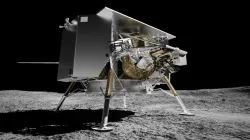Moon landing attempt by US company in jeopardy after 'critical' fuel leak
Astrobotic was aiming to be the first private business to successfully land on the moon, something only four countries have accomplished. A second lander from a Houston company is due to be launched next month.

The first US moon landing attempt in over 50 years seemed to be in jeopardy after a private company’s spacecraft developed a “critical” fuel leak, merely hours after launch on Monday (January 8). Pittsburgh-based Astrobotic Technology managed to orient its lander toward the sun so that the solar panel could collect sunlight and charge its battery, as a special team assessed the status of what was described as a “failure in the propulsion system”.
It soon became apparent that there was a “critical loss of fuel”, and dimmed the hope of planned landing on the moon on February 23.
What did the company say?
“We are currently assessing what alternative mission profiles may be feasible at this time,” the company said in a statement.
The issue was to the fore nearly seven hours after the predawn liftoff on Monday from Cape Canaveral Space Force Station. United Launch Alliance's Vulcan rocket provided the lift for Astrobotic's lander, named Peregrine, putting it on a long, roundabout path to the moon.
A propulsion system problem “threatens the ability of the spacecraft to soft land on the moon," the company said.
The lander is lashed with engines and thrusters for maneuvering, and for its journey to the moon and also for lunar descent.
Astrobotic was aiming to be the first private business to successfully land on the moon, something only four countries have accomplished. A second lander from a Houston company is due to be launched next month.
NASA's contribution
NASA contributed millions to the two companies to build and fly their own lunar landers.
Astrobotic’s contract with NASA for the Peregrine lander amounted to nearly USD108 million and it has more in the pipeline.
Before the flight, NASA's Joel Kearns, deputy associate administrator for exploration, noted that while using private companies to make deliveries to the moon will be cheaper and quicker than going the usual government route, there will be added risk.
He stressed that the space agency was willing to accept that risk, noting Monday: “Each success and setback are opportunities to learn and grow.”
The last time the US launched a moon-landing mission was in December 1972. Apollo 17's Gene Cernan and Harrison Schmitt became the 11th and 12th men to walk on the moon, closing out an era that has remained NASA's pinnacle.
The Soviet Union and the US racked up a string of successful moon landings in the 1960s and 70s, before putting touchdowns on pause.
China joined the elite club in 2013 and India in 2023. India’s Chandrayaan-3 landed on the moon on August 23 last year.
(With AP inputs)